The Roger Tory Peterson Institute of Natural History (RTPI) provides educational programming for grades 3 through 12. All lessons are age-appropriate and align with State Learning Standards. An RTPI educator will visit your classroom and provide a self-contained lesson for your students. Please contact Melanie Smith, Manager of Education and Communications at (716) 665-2473 x221 or msmith@rtpi.org for more information.
“For the Birds”; Roger Tory Peterson and Peterson Field Guides
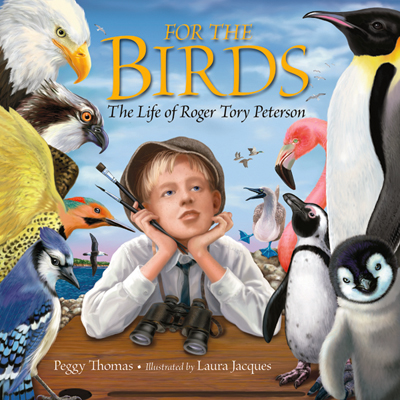 Grade levels: Grade 3 – 5
Grade levels: Grade 3 – 5
Based on the children’s biography “For the Birds, The Life of Roger Tory Peterson” by Peggy Thomas and Laura Jacque, this program teaches children about Roger Tory Peterson’s life, starting as a youth in Jamestown and developing into a world-renowned naturalist, artist, and educator. Participants learn about the Peterson Field Guides and the Peterson system of nature identification and will put their newfound skills to the test in a game that challenges them to identify various birds.
Roger Tory Peterson Speaks for the Birds
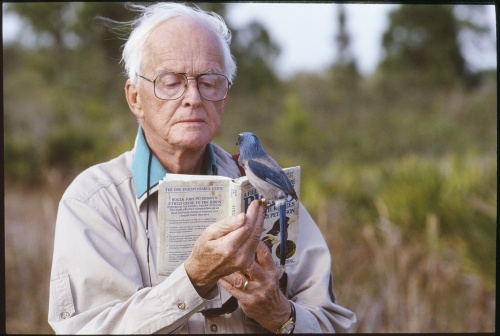 Grade levels: Grade 6-8
Grade levels: Grade 6-8
Participants learn about Peterson’s local roots and his life as a naturalist and engaged environmentalist. Using one of Peterson’s favorite birds – the osprey – as a model, students participate in an activity that illustrates the concept of bioaccumulation. They will learn how pesticides like DDT were found to affect birds of prey, and how Peterson’s personal observations and his interactions with scientists played a key role in highlighting the dangers it poses. Connections are drawn to modern-day environmental issues affecting birds, such as plastic pollution. The program also illustrates the power all of us have to make a difference.
Roger Tory Peterson’s Backyard Nature
Grade levels: Grades 7-12
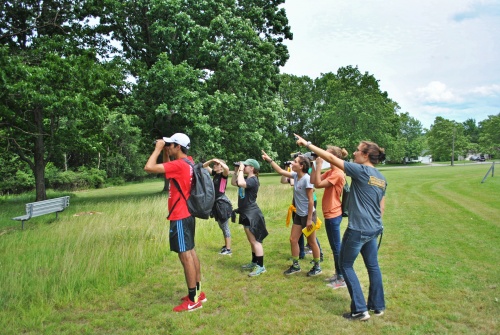 Roger Tory Peterson was fascinated by the wildflowers, moths, birds, and other nature that he found in and around his hometown of Jamestown, NY. As a kid, he studied, drew, and photographed them, and these experiences formed the inspiration for his professional life. More than a century later, Jamestown still harbors inspirational nuggets of natural importance and beauty – even though most people don’t see them. This modular educational program highlights several case studies that focus on at-risk species living in the greater Jamestown area, such as turtles (focus on Spiny Softshell Turtle) or aerial insectivores (focus on Chimney Swift, Common Nighthawk, and bats). RTPI staff will introduce the focal species, discuss the relation between their original natural habitat and their man-made urban habitat, explore research questions that need answering to properly protect these species, and discuss what role a 21st century urban environment should play to support people and nature. Lessons are customizable and walking field trips to observe focal species in their urban habitats are seasonally available upon request.
Roger Tory Peterson was fascinated by the wildflowers, moths, birds, and other nature that he found in and around his hometown of Jamestown, NY. As a kid, he studied, drew, and photographed them, and these experiences formed the inspiration for his professional life. More than a century later, Jamestown still harbors inspirational nuggets of natural importance and beauty – even though most people don’t see them. This modular educational program highlights several case studies that focus on at-risk species living in the greater Jamestown area, such as turtles (focus on Spiny Softshell Turtle) or aerial insectivores (focus on Chimney Swift, Common Nighthawk, and bats). RTPI staff will introduce the focal species, discuss the relation between their original natural habitat and their man-made urban habitat, explore research questions that need answering to properly protect these species, and discuss what role a 21st century urban environment should play to support people and nature. Lessons are customizable and walking field trips to observe focal species in their urban habitats are seasonally available upon request.
Tropical Rainforest in Your Classroom
Grade level: Grade 5
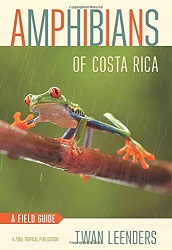 RTPI’s Director of Science & Conservation, Twan Leenders studies endangered tropical amphibians and reptiles, as well as migratory birds that live in Latin America but migrate to our backyards to nest each year. Students will meet and interact with Dr. Leenders and learn about his scientific research and experiences in the tropics. Complimentary experiences are available in which students explore the sights and sounds of the rainforest using innovative virtual reality technology. Opportunities to communicate directly with rainforest researchers and their students in the field through live-streamed connections are seasonally available upon request.
RTPI’s Director of Science & Conservation, Twan Leenders studies endangered tropical amphibians and reptiles, as well as migratory birds that live in Latin America but migrate to our backyards to nest each year. Students will meet and interact with Dr. Leenders and learn about his scientific research and experiences in the tropics. Complimentary experiences are available in which students explore the sights and sounds of the rainforest using innovative virtual reality technology. Opportunities to communicate directly with rainforest researchers and their students in the field through live-streamed connections are seasonally available upon request.
Poison Dart Frogs in Your Classroom
Grade level: Grade 3
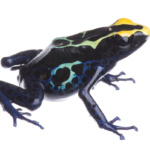 RTPI’s Director of Science & Conservation, Twan Leenders is a conservation biologist who has spent much of the past 25 years working with some of the world’s most endangered frogs in remote parts of Central America and Western Africa. His work focuses mostly on understanding the complex natural history of amphibians that live in tropical rainforest (adaptations), as well as developing conservation strategies to ensure that these endangered frogs do not go extinct. He has authored several books on amphibians and reptiles. Students will meet several species of live poison dart frogs and learn about their biology, exploring topics of frog diversity and adaptations.
RTPI’s Director of Science & Conservation, Twan Leenders is a conservation biologist who has spent much of the past 25 years working with some of the world’s most endangered frogs in remote parts of Central America and Western Africa. His work focuses mostly on understanding the complex natural history of amphibians that live in tropical rainforest (adaptations), as well as developing conservation strategies to ensure that these endangered frogs do not go extinct. He has authored several books on amphibians and reptiles. Students will meet several species of live poison dart frogs and learn about their biology, exploring topics of frog diversity and adaptations.




